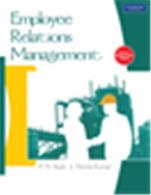Employee Relations Management

|
Author(s):
Author:
P. N. Singh
- ISBN:9788131726013
- 10 Digit ISBN:8131726010
-
Price:Rs. 850.00
- Pages:420
- Imprint:Pearson Education
- Binding:Paperback
- Status:Available
-
|
The introduction of the new economic policy in 1991 had a significant bearing on industrial relations. Coupled with liberalization, these policies changed the way industries functioned in India. It forced the government, employers and trade unions to align themselves to new realities. There is an ongoing transition in industrial relations on the global scale as well. The focus is gradually shifting from traditional industrial relations, characterized by conflict resolution, to employee relations management, characterized by collaborative partnerships between the employers and the employees.
Employee Relations Management focuses on this ongoing transition from industrial relations to employee relations. It introduces readers to the fundamental concepts and relevant pieces of legislation against the backdrop of globalization and the new economic policy.
Table of Content
Part I: Context
- Industrial Relations: Evolution and Growth
- Industrial Relations in India
- Industrial Relations in Major Industrialized Economies: A Comparative Study
- The Changing Characteristics of Industry and Workforce in India
- Trade Unionism and Trade Unions
- Trade Unions in India
Part II: Paradigm Shift
- From Industrial Relations to Employee Relations
- Employee Relations Management at Work
Part III: Legislations And Administration
- Labour Legislation in a Changing Context
- Social Security Legislations
- Wage Legislation
- Industrial Relations: Institutional Framework for the Prevention and Settlement of Industrial Disputes
- Industrial Conflict: Settlement Machinery
- Industrial Disputes: Institutional Framework and Preventive Measures
- Wage Determination, Wage Administration and Employee Relations
- Labour Administration
Part IV: Skills
- Negotiation Essentials for Employee Relations
- Soft Skills for Employee Relations
|
Salient Features
- The book focuses on the ongoing paradigm shift from traditional industrial relations, characterized by conflict resolution, to employee relations management, defined by a collaborative partnership between employers and employees.
- Includes four unique chapters on the shift from industrial relations to employee relations, the implementation of employee relations management, negotiation skills and soft skills
- The book incorporates many pedagogical elements such as opening vignettes, margin definitions, margin snippets, key terms and chapter summaries.
- Each chapter includes “For Class Discussion” boxes that pose thought-provoking questions, illustrate the application of concepts and laws to difficult workplace situations.
- There are review questions topics for debate and questions for critical thinking at the end of each chapter.
|
|
|
|
|